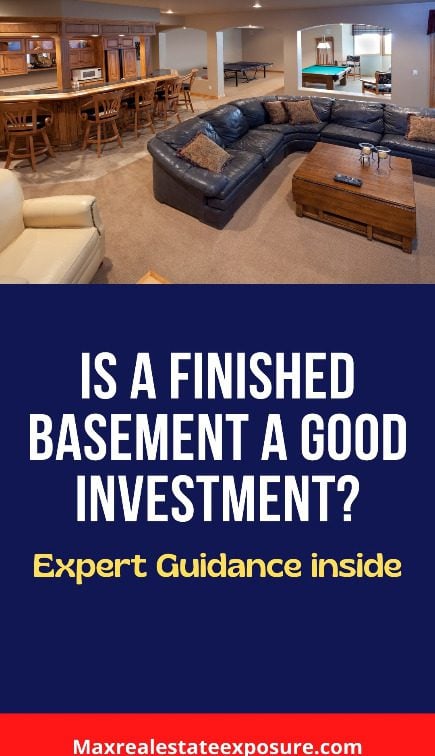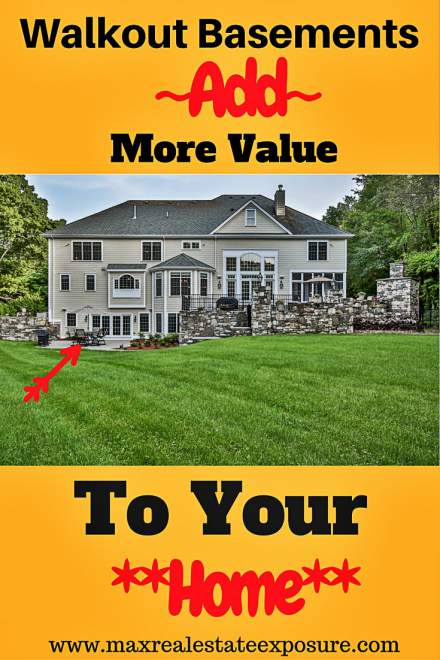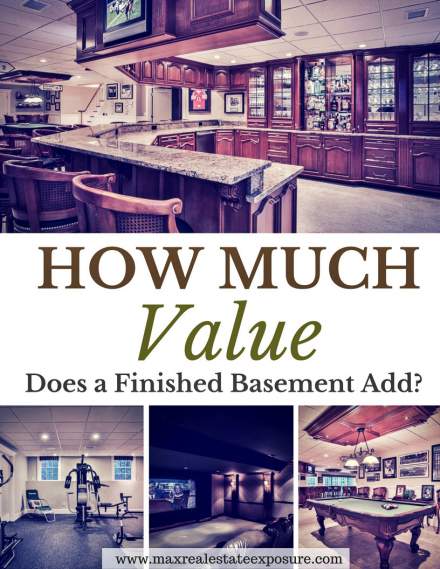 How Much Does a Finished Basement Cost?
How Much Does a Finished Basement Cost?
One of the questions I often get is, “does a finished basement add value to my home?” This question is often followed by “how much does it cost to finish a basement?”
Many will also ask my opinion on the finished basement ideas they are considering.
Finished basements can add a lot of extra living space, so, understandably, many owners choose to renovate the space under their homes.
Whether you want to add an extra bedroom, a theater, or a workout room, the basement gives you options that you otherwise wouldn’t have – unless you wanted to add an above-ground addition to the home, which would be more expensive.
Besides adding space, a finished basement could also increase the value of your home.
It is essential, however, to recognize that you may not get every dollar back when you sell.
Basements are evaluated differently than above-ground space, something to consider when remodeling.
Basements, however, are improvements that increase home value. The finished area in the lower level of your home will add value to the price of your home; it just won’t be the same as the above-grade space on a cost-per-square-foot basis.
Basements, however, can be desirable areas to finish due to the amount of square footage you can pick up relatively inexpensively vs. adding an addition.
While the value added to your home from finishing your basement may not be as much as you hoped, you will save money by adding living space under the house instead of above ground.
Adding above-ground is expensive, while the basement already has a floor, walls, wiring, plumbing, and a roof – making it relatively affordable to renovate.
What Does a Finished Basement Cost?
Are you wondering how much for a finished basement?
The cost of a finished basement can vary tremendously based on what’s done and the size of the space. Do you want the quality of the space to match the quality of the above levels?
When you have plastered walls and ceilings, beautiful finish woodwork, quality flooring, and ample lighting, you can expect your costs to be higher.
There are so many ways in which you can finish your basement. They go from economy up to luxury and everything in between. You could spend $10,000 on the low end up to hundreds of thousands of dollars with luxury features like home theaters, kitchens, built-in bars, and home gyms.
Many buyers today invest significant amounts of money in the basement space, especially when there is a walk-out and full-size windows.
Average Finished Basement Cost
The average finished basement cost runs around $30,000 to $35,000. It cannot be emphasized enough that the cost of finishing a basement will depend highly on how much space and the types of finishes used.
In my area of Massachusetts, most owners spend between $50,000-$100,000 finishing their basements.
Finished Basement Cost Per Square Foot
The cost of finished basements per square foot is highly variable. On the low end, you may find a contractor willing to finish a basement for around $25-35 per square foot.
On the high end, you can expect to pay $75-$150 per square foot for a finished basement with luxury features. The average for quality living space similar to upstairs without adding additional amenities will run at approximately $50-60 per square foot.
To understand how much it will cost to finish your basement, speaking to multiple contractors for finished basements will be worthwhile.
You will likely find out that the contractors for finished basements will vary in cost. You will need to compare apples to apples on what you’re getting.
Is Finishing a Basement Considered a Good Investment?
 Is finishing a basement worth it?
Is finishing a basement worth it?
The return on investment for a finished basement runs at 70-80% of the cost. So, don’t expect to get all your money back when selling.
However, you can’t put a price tag on the enjoyment you and your family will get from having the space. The time and memories created could be invaluable.
The return on investment for a finished basement will be better when you have a daylight basement, especially when it is a walk-out.
What Adds The Most Value When Finishing a Basement?
Two of the most value-added features for a basement are a bedroom and a full bath. Many buyers value having an extra bedroom suite for guests.
However, it is essential to note the space needs to meet the requirements for a bedroom. Buyers prefer basement space with full windows. A basement without windows does not have nearly the same appeal, especially for bedrooms.
Having a bathroom is also a significant benefit. The bathroom can be in the main living area or part of an ensuite bathroom.
Remember that finishing a basement will add value but not the total cost.
How Long Does it Take to Finish a Basement?
You can expect the basement finish time to range between two to four months. The more complex the added features, the longer it will take.
For example, if you are adding a kitchen or home theater, it will take much longer. Adding walls and basic flooring will be on the short end of the estimated time.
Do I Need a Permit For a Finished Basement?
Yes. It is a significant mistake not to pull a building permit when finishing a basement. You should always take out a construction permit for work in your basement.
Your home will be much harder to sell, and you may even find that the local inspector makes you rip out walls! Make sure your contractor for the finished basement pulls the necessary permits.
Does a Finished Basement Count as Square Footage?
It is essential to understand that finished basement space is considered part of the gross living area. However, it does not count as square footage. Only the living area above grade is considered in the home’s square footage.
So, the basement is considered living space but not square footage. When marketing homes, real estate agents should display the square footage as above-grade space and finished basements as part of the gross living area.
Understanding How Finished Basements Are Valued
When an appraiser considers the value of a home, they need to make apples to apple comparisons – which means that living space above ground is valued separately from space below ground.
Space above ground is worth more. This makes perfect sense as the cost of finished basement space is far more inexpensive to add than the above-grade living area.
If there is a home similar to yours with similar square footage features, and in the same neighborhood, the value of both homes would be somewhat equal. But if a quarter of your square footage is in the finished basement – underground living space – then the value of your home would be less than the home with all above-ground square footage.
You can find various estimates of the value of basements, ranging between 50% and 70% of the above-ground value.
While these estimates help get an idea of what your finished basement will be worth, you will need to talk with professionals working in your area to get a clearer picture of how much value you can get from your renovations.
Estimates are just that! Never use an estimate to put a value on your home correctly.
Reaching out to a local appraiser or professional real estate agent is advisable to understand how much value a basement will add to your home.
In addition, DO NOT use Zillow estimates as a means of valuing your home! This is a sure fire way to get the wrong value for not only your property but your basement space as well. Zillow has no idea what kind of basement space you have, never mind the rest of your house!
Types of Basement Space Have Different Values
 The kind of finished space in the lower level of your home can significantly impact the value a buyer will be willing to pay.
The kind of finished space in the lower level of your home can significantly impact the value a buyer will be willing to pay.
Essentially, three types of grading on a home site will determine the value you can get out of a finished basement.
The three basement types are as follows:
A Full Walk-Out Basement
A full walk-out lower level is the most valuable living space because you can have regular size windows, sliding glass, or atrium doors.
A full walk-out basement gives you significant natural light and fresh air.
With natural light, a finished lower level often does not feel like a basement at all. The other benefit of a full walk-out basement is to exit the home through a regular door, not a bulkhead.
The walkout basement often allows a great area with a beautiful patio and other landscape features.
You can see some great examples of walkout basements at Houzz. A walk-out basement is considered better than other options.
Basements With a Partial Drop in Land Grade
With this basement setup, you can still have some full-size windows. However, you may or may not have the ability to have a full-size door. The grade of the land does not allow for it.
This type of setup is not quite as attractive as a full walk-out lower level. The other term used for this situation is a garden-level lot.
A Non-Walk-Out Basement
A non-walk-out basement is the least attractive type of lower-level living space. You have four concrete walls and no natural light other than through some tiny standard basement windows.
Never underestimate the value of having natural light in a cellar area!
While these are three forms of basement space based on the grading of the lot, other general characteristics can change the value of a basement.
For example, does the area have a “dropped ceiling,” or is it plastered like the above grade levels? Does it have the same finish trim work and doors the upstairs has? The more a basement feels like above-grade space, the better value it will command!
Basement Improvement Options – Personalized vs. Resale Value
One of the best things about finishing the basement is that you can make it into a space that fits you, your needs, your hobbies, etc.
But the problem with being more personalized is that it can make selling the home more challenging if and when you decide to sell.
When deciding how to finish the basement, you will need to weigh your desire to have exactly what you want with the possibility of wanting to sell the home.
Adding things like a family room, bedrooms, and a bathroom may be relatively dull options, but they will be the easiest to sell later. People like having extra space and basic rooms that allow buyers to decide what they will use the basement for.
The more specialized you get, such as a home theater, workout room, wine storage, etc., the greater chance that some buyers will not be willing to pay for these things.
Potential buyers may have no interest in these additions or at least not be willing to pay any more to have them in their new home.
Of course, the opposite could be true depending on the area where your home is. Wine storage in Beverly Hills could be a selling point, while it may be less appealing in Topeka, Kansas.
Good Lighting, Walk-able Space, and Proper Drainage
Whatever configuration you choose for your finished basement, ample lighting and ceilings at least 8 feet tall should be included throughout the area.
Neither you nor any new owners will want to spend time in the basement if it is too dark. You want lots of light to make the space comfortable. Ceilings must be a minimum of 7’6” high, but 8 feet or higher is preferable.
It is probably better to save money and avoid finishing the area if you cannot get high enough ceilings when renovating.
Digging down to create more room is generally not a good idea, as it can be expensive and risk undermining the house’s structure.
If you consider finishing your basement, plan for any water or moisture issues. One of the biggest nightmares you will deal with is pouring money into your lower level only to find out you have a water problem.
If necessary, take the time to seal any foundation cracks and install French drains or a sump pump. Spending the money on these items is the kind of insurance that is well worth it!
Ideas For Finished Basement
 Are you looking for finished basement ideas?
Are you looking for finished basement ideas?
Over my thirty-seven years selling real estate, many homeowners and buyers have asked me what popular finished basement features are in a house.
Let’s review ideas you can put to use for your basement.
In my area of Metrowest, Massachusetts, which I am sure applies to other areas of the country, there are certain features that buyers love to find in a finished basement space.
Here are some of the popular ideas for a basement:
An In-Law Suite
There are lots of home buyers who look for the opportunity to have a parent live with them.
Finding an in-law suite in a finished basement is sometimes easier than adding an addition above grade.
If the home has a walk-out basement, it’s even better as it allows for easy access in and out for an older adult. Just be sure to research whether you can add a second kitchen.
Some cities and towns have regulations that prohibit adding a second kitchen to a home.
Adding a Home Theater
Some of the theaters in homes today are just incredible. You don’t even need to go to the movies anymore to get a similar experience in your own home.
HGTV has some incredible home theater ideas with photos worth a look at.
Sports Bar/Man Cave
Ask any male if he would like a place to hang with friends and have a beer, and he is bound to say, “hell ya”! The sports bar has become a prevalent feature in luxury homes.
Playrooms
There is a significant amount of buyers who want a place for their kids to hang out with friends. Even if buyers have younger kids, a finished basement allows the perfect opportunity to get the toys and games out of other areas of the home.
Playrooms are one of the most high-demand features among home buyers.
Work Out Room or Home Gym
Many buyers love the thought of being able to work out in their own homes rather than join a gym. Home gyms are great for numerous buyers in a finished basement space.
Wine Rooms
A small percentage of buyers would kill to have a dedicated space for their wine. See some remarkable examples of wine cellars here. This basement idea isn’t as popular as some others.
Most folks who want this feature are wine connoisseurs.
Guest Bedroom
A guest bedroom is one of the best ideas for a basement. Some buyers don’t need a full in-law suite but a place for occasional guests or family members who visit now and again.
As mentioned above, some buyers may not be willing to pay for these basement features.
Watch Out For Agents Who Make Valuation Mistakes
 If you are thinking of selling your home and have a finished basement, you are probably wondering how much value it adds and, therefore, how to price your home.
If you are thinking of selling your home and have a finished basement, you are probably wondering how much value it adds and, therefore, how to price your home.
Pricing a home correctly is an art and a skill. Unfortunately, a reasonably high percentage of real estate agents do not know how to price a home accurately.
When finished basement space is involved, the chances for error increase even more.
Making valuation mistakes happens more frequently with finished basement space because some agents like to lump the basement finished space into the overall square footage of the house.
This is a HUGE mistake. As mentioned, the finished basement space does not have the same value as the above-grade space!
For example, two homes in the same neighborhood have similar amenities and features. Home “A” has 3000 square feet, all above grade.
Home “B” has 2500 square feet above grade and 500 square feet in a finished lower level.
All other things being equal, home “A” will have a higher value than home “B.” Home “A” is worth more because above-grade space is considered more valuable.
Some agents would incorrectly use these two homes as “comps” and justify the value based on gross living area. This is why the price per square foot is not a good value indicator.
Real Estate agents who use price per square foot to value a property almost always get the price wrong.
Understanding Finished Basement Appraisal Guidelines
From Fannie Mae appraisal guidelines on how appraisers should value finished basement space:
“Rooms that are not included in the above-grade room count may add substantially to the value of a property, particularly when the quality of the finish is high.
Therefore, the appraiser should report the basement or partially below-grade areas separately and make appropriate adjustments on the Basement & Finished Rooms Below-Grade line in the Sales Comparison Approach adjustment grid.
For consistency in the sales comparison analysis, the appraiser should compare above-grade areas to above-grade areas and below-grade areas to below-grade areas.”
This is how a real estate agent should value a basement as well!
Other than comparing living areas correctly, this is how to price a home accurately. You will see that valuation needs to be done “apples to apples.”
Sold properties should be emphasized along with homes under contract.
What is for sale is important but not nearly as much as what has sold. Remember, your neighbor’s home price can change at the drop of a hat. Who knows if it is the right price?
Sold properties offer concrete data points that can be used to establish accurate values.
Does Finishing a Basement Increase Property Taxes?
Yes, if you do things legally and pull permits. Some homeowners will finish a basement without pulling permits to avoid the assessed property value going up.
When the city or town knows you have finished your basement, you can expect to pay more taxes. Your tax assessment will increase due to your property being more valuable.
Should You Finish The Basement When Planning To Sell a Home?
A finished basement is not a clear winner when it comes to possible renovations that aid in selling a home. Sure, you can spend the money and hope buyers will get excited about the improvement, but there is no guarantee that they will.
They may be more excited about an unfinished basement because it gives them a clean slate to create their own customized living space.
While you may enjoy a home theater, buyers could prefer a workout room – or vice versa. Besides, there is no guarantee that you will make back all your money from the renovations.
Finishing the basement may make more sense if you plan on staying in the home for several years or longer. You should enjoy your home while you are living there.
If a finished basement improves your living experience over the long term, it could be worth the money and the effort.
Talk To Your Realtor About Finished Basements
Whatever renovations you are considering before selling your home, it is worth sitting down with your agent to go over the cost and benefits of each option. Some may end up renovating vs. moving.
Many homeowners have the mistaken impression that renovations and additions add to the price of their homes.
In reality, there are only specific improvements that are worth the investment. Talk to a professional real estate agent before you make any big decisions about adding to your home.
Final Thoughts on Finished Basements
There are numerous excellent ideas for finishing a basement. They can add significant value to your home but probably not as much as you expect. Whenever finishing a basement, speak to qualified finished basement contractors.
Additional Helpful Real Estate Resources
- Appraisal rules for evaluating basements – see some excellent advice from appraiser Tom Horn who explains the rules regarding finished basements.
- What home improvement projects add value – learn about essential projects that can add value to your property via Kyle Hiscock at Behance.
Use the additional resources to see how a finished basement and other improvements affect the value of a home.
About the Author: The above Real Estate information on finished basement ideas, costs, and added value was provided by Bill Gassett, a Nationally recognized leader in his field. Bill can be reached via email at billgassett@remaxexec.com or by phone at 508-625-0191. Bill has helped people move in and out of many Metrowest towns for the last 37+ Years.
Are you thinking of selling your home? I am passionate about real estate and love sharing my marketing expertise!
I service Real Estate sales in the following Metrowest MA towns: Ashland, Bellingham, Douglas, Framingham, Franklin, Grafton, Holliston, Hopkinton, Hopedale, Medway, Mendon, Milford, Millbury, Millville, Northborough, Northbridge, Shrewsbury, Southborough, Sutton, Wayland, Westborough, Whitinsville, Worcester, Upton and Uxbridge MA.


Totally relevant article. The consumer really has a problem with valuing the basement in the price of their homes. This article will be a great help.
Thanks,
Sandra, I am glad you found the information helpful. Quite a few homeowners over estimate the value of a basement.
Bill, thank you for the information…we do not have basements in Myrtle Beach, but I love having the information for my clients who are relocating here from the North. Never gave a thought to the above grade and below grade valuation, I love learning new things! Thanks again.
Thanks Kathy. Basements are common here in the Northeast. You do see a slab ranch up here from time to time but for the most part our homes have basements. Over the last decade I have seen people turn their drab basements into incredible living areas!
I have a finished basement but it is not heated nor air conditioned, is it considered living space?
Robert technically no it is not. Living area needs to be heated.